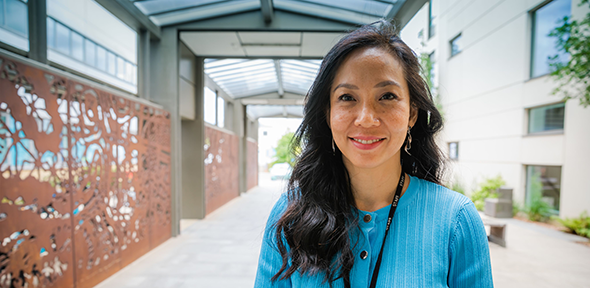
Submitted by Irena Rao on Thu, 10/04/2025 - 18:23
Researchers at the Early Cancer Institute have created a "metal detector" algorithm called PRRDetect to hunt down vulnerable tumours, in a development that could one day revolutionise the treatment of cancer.
In a paper published on Thursday 10th April in Nature Genetics, scientists funded by Cancer Research UK and the National Institute for Health and Care Research (NIHR) analysed the full DNA sequence of 4,775 tumours from seven types of cancer. Based at the University of Cambridge and NIHR Cambridge Biomedical Research Centre, they used that data from Genomics England’s 100,000 Genomes Project to create an algorithm capable of identifying tumours with faults in their DNA that makes them easier to treat.
The algorithm could one day help doctors figure out which patients are more likely to have successful treatment. That could pave the way for more personalised treatment plans that increase people’s chances of survival.
Early Cancer Institute Research Group Leader Serena Nik-Zainal, who is Professor of Genomic Medicine and Bioinformatics at the University of Cambridge, NIHR Research Professor and lead author of the study, said:
"Genomic sequencing is now far faster and cheaper than ever before. We are getting closer to the point where getting your tumour sequenced will be as routine as a scan or blood test.
"To use genomics most effectively in the clinic, we need tools which give us meaningful information about how a person’s tumour might respond to treatment. This is especially important in cancers where survival is poorer, like lung cancer and brain tumours.
"Cancers with faulty DNA repair are more likely to be treated successfully. PRRDetect helps us better identify those cancers and, as we sequence more and more cancers routinely in the clinic, it could ultimately help doctors better tailor treatments to individual patients."
Serena praised the effort and determination of group member Dr Gene C.C. Koh, a Sir Jeffrey Cheah Early Career Research Fellow, who led the project, alongside many other researchers in her group.
For the full story, please visit University of Cambridge News - Scientists create 'metal detector' to hunt down tumours
Paper: Koh, GCC et al. A redefined indel taxonomy reveals insights into mutational signatures. Nat Gen; 10 Apr 2025; DOI: https://doi.org/10.1038/s41588-025-02152-y
